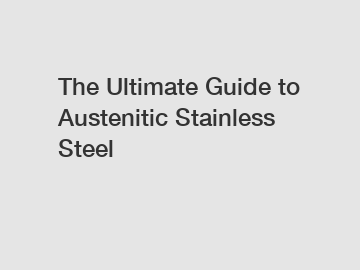The Ultimate Guide to Austenitic Stainless Steel
Are you looking to learn more about Austenitic stainless steel? Look no further! In this article, we will provide you with the ultimate guide to Austenitic stainless steel, covering everything you need to know about this versatile and widely-used material.
What is Austenitic Stainless Steel?
1. Austenitic stainless steel is a type of stainless steel that contains high levels of chromium and nickel. This composition gives it excellent corrosion resistance, high strength, and good formability.

2. This type of stainless steel is non-magnetic and has a face-centered cubic (FCC) crystal structure, making it ideal for a wide range of applications, including food processing, chemical processing, and medical devices.
Benefits of Austenitic Stainless Steel.
1. Corrosion resistance: Austenitic stainless steel is highly resistant to corrosion, making it suitable for use in harsh environments where other materials may fail.
2. Strength and durability: This type of stainless steel offers high strength and durability, making it a popular choice for structural applications.
3. Formability: Austenitic stainless steel can be easily formed and welded, allowing for complex shapes and designs to be achieved.
4. Hygienic properties: This material is easy to clean and maintain, making it ideal for use in industries where cleanliness is essential, such as food processing and pharmaceuticals.
Common Grades of Austenitic Stainless Steel.
1. 304: This grade is the most commonly used type of austenitic stainless steel and is often referred to as "18/8" stainless steel due to its composition of 18% chromium and 8% nickel.
2. 316: This grade is known for its higher corrosion resistance compared to 304, thanks to the addition of molybdenum. It is commonly used in marine environments and chemical processing plants.
3. 321: This grade contains titanium, which stabilizes the material against chromium carbide precipitation, making it suitable for high-temperature applications.
Applications of Austenitic Stainless Steel.
1. Food processing equipment: Austenitic stainless steel is widely used in the food and beverage industry due to its hygienic properties and corrosion resistance.
2. Medical devices: This material is commonly used in surgical instruments, medical implants, and hospital equipment due to its biocompatibility and sterilization capabilities.
3. Chemical processing: Austenitic stainless steel is ideal for use in chemical processing plants, where corrosion resistance is essential to prevent leaks and contamination.
In conclusion, Austenitic stainless steel is a versatile and durable material that offers many benefits for a wide range of applications. From its corrosion resistance and strength to its formability and hygienic properties, this type of stainless steel is a top choice for various industries. If you are in need of Austenitic stainless steel, contact us today to learn more about our products and services as a reliable supplier in the industry.
Contact us to discuss your requirements of alloy 347 tube, sdss pipe factory, alloy 904l tubing price. Our experienced sales team can help you identify the options that best suit your needs.

Comments